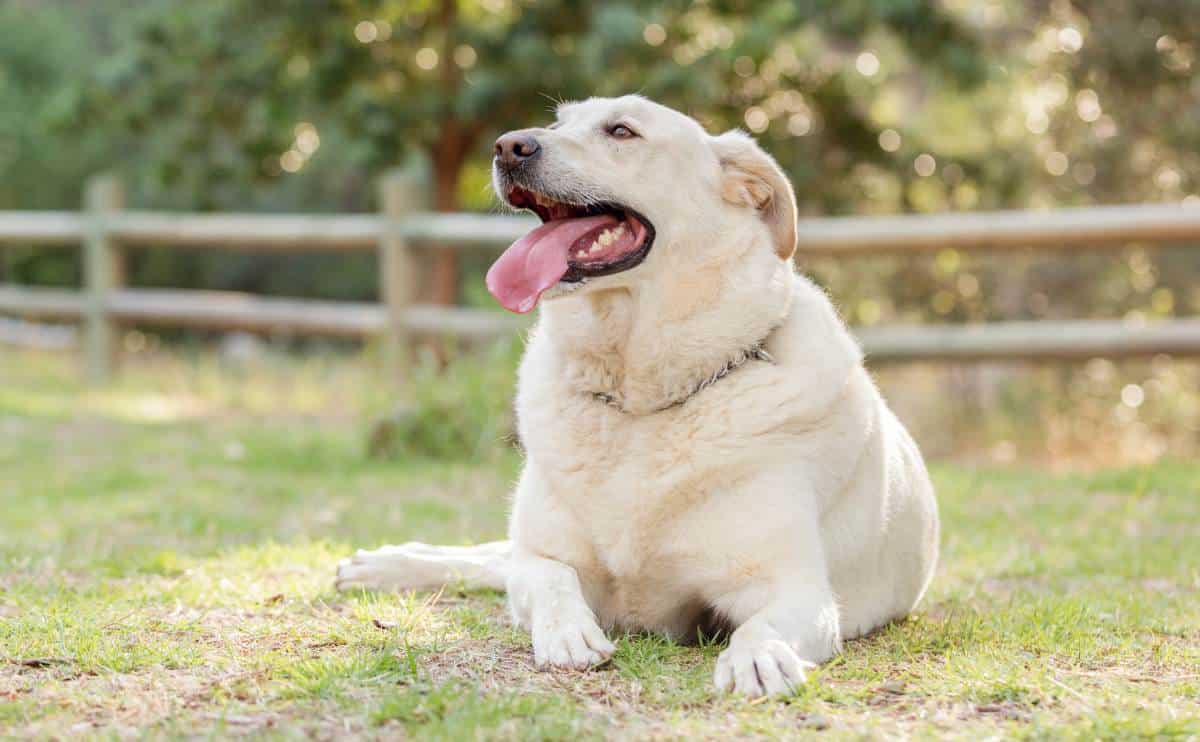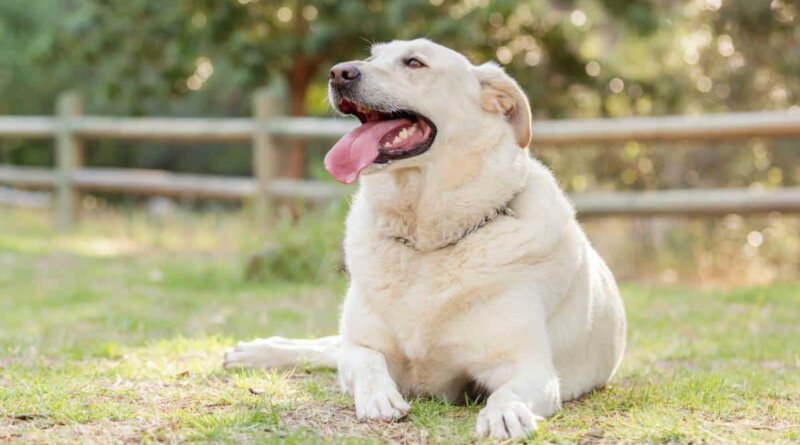New Study Finds That 1 In 4 Labs Have A High Genetic Risk For Obesity
[ad_1]

Are you struggling with a pup who has a seemingly insatiable appetite? Or perhaps your dog has a problem gaining weight despite not overeating. It turns out there’s a genetic reason for these issues. New research finds that a genetic mutation putting pups at high risk for obesity is found in 25% of Labrador Retrievers and 66% of Flat-Coated Retrievers.
The mutation occurs in the POMC (pro-opiomelanocortin) gene, which plays a crucial role in regulating appetite and metabolism. Essentially the genetic variant alters normal signaling to the brain. It’s a double sucker punch for affected pups, making them feel constantly hungry while burning fewer calories. And this mutation can lead to serious weight management problems for pup owners.
I interviewed the lead researcher of this study, Dr. Eleanor Raffan, a former practicing veterinarian, for added insights into her research and her expert advice for pup owners. It’s a much-needed field of research, which not only can shed light on our dogs but also the genetics behind human obesity.
Research Highlights
Researchers published their most recent findings in the journal Science Advances in March 2024. Led by Eleanor Raffan, Ph.D., assistant professor at the University of Cambridge, the team first reported their discovery of the genetic mutation in dogs several years ago. Key findings from their ground-breaking studies include:
- A mutation of the POMC gene is associated with increased body weight, body fat, and food motivation in dogs.
- Out of 35 breeds tested, only Labradors and FCRs had this genetic variant. However, mixed breeds can also inherit this genetic mutation.
- The POMC mutation affects an estimated 25% of Labradors and 66% of Flat-Coated Retrievers (FCRs).
- Dogs with the POMC mutation expend 25% less energy at rest versus those without it.
- Low resting metabolic rate and increased hunger are due to β-MSH and β-endorphin deletion in the POMC gene.
Background
Dr. Eleanor Raffan and her team at the University of Cambridge discovered the POMC genetic variant in dogs in a 2016 study. After sequencing three candidate genes for obesity in Labrador Retrievers, they identified a deletion (mutation) in the POMC gene. This deletion disrupts the body from proper brain signaling resulting in greater body weight and fat and increased food motivation.
They tested 35 different breeds, and the mutation was only found in Labradors and Flat-Coated Retrievers. Nearly 25% of Labradors studied had at least one copy of this variant. “In that study, owners told us it made their dogs more highly food-motivated around the house. We concluded that this genetic deletion predisposed affected dogs to obesity, “says Dr. Raffan.
A former practicing veterinarian, Dr. Raffan explains why she pursued this line of research. “I was concerned by the number of overweight dogs I saw whose quality of life was being affected by excess weight. But I was a bit judge-y back in my clinical days. Now I really understand the challenges owners of highly food-motivated dogs face to keep them slim.”
2024 Study Details
Building on her previous findings, Dr. Raffan launched into her latest published study. “We have now gone on to look at different parts of what makes up food motivation and the energy expenditure side of things, too,” she says.
The study involved 87 adult pet Labrador Retrievers, all of whom were at a healthy weight or moderately overweight. Canine subjects included both those who carry the POMC mutation and those who don’t. Researchers conducted a series of tests to measure energy expenditure and a “sausage in a box” test to evaluate food motivation.
First, after a 14-hour fast, scientists fed the dogs a can of dog food every 20 minutes until they chose to stop eating. While all 87 ate enormous amounts of food, the dogs with the POMC mutation didn’t eat more than those without it. This told researchers that they all felt full with a similar amount of food.
On a different day, scientists fed the dogs a standard amount of breakfast. Exactly three hours later, they were offered a sausage in a box which allowed the pups to see and smell the sausage but not eat it. Researchers found that dogs with the POMC mutation tried significantly harder to get the sausage from the box than dogs without it, indicating greater hunger.
In another test, the dogs slept in a special chamber that measured the gases they breathed out. This revealed that dogs with the POMC mutation burn around 25% fewer calories at rest than dogs without it. See the “sausage in a box” test in action in this brief video below produced by researchers.
Study Implications Moving Forward
How does this body of research affect our understanding of the genetics behind obesity in dogs and humans? The new findings are consistent with reports of extreme hunger in humans with POMC mutations, who tend to become obese at an early age and develop a host of clinical problems as a result.
Dr. Raffan weighs in. “Our work has some quite niche interest to people studying this gene and how it works, which are important at a time when drugs that mimic POMC are increasingly used in the clinic to treat obesity. But the major relevance is to illustrate the power of our genes to alter our sensation of hunger, appetite, and energy expenditure.”
In addition, Dr. Raffan hopes her research can help alter society’s perception of obesity. “This should start to lift some of the negative talk about human obesity (or dog obesity) being a ‘lifestyle disease’ and open people’s eyes to the fact that our genes can make it much harder for some people to keep themselves or their dogs slim.”
What’s On The Horizon?
A leader in the field of canine genetic obesity research, Dr. Raffan continues to build upon her findings. “We are now looking into Labradors and many other breeds and non-breed dogs for other genetic changes associated with increased foodiness and weight gain,” she says.
How To Help Minimize Your Dog’s Hunger & Retain A Healthy Weight
Some dogs experience hunger more acutely than others. Even without that mutation, many highly food-motivated dogs seem to think about food all day long and the calorie restriction that is necessary for weight loss makes hunger worse. Dr. Raffan believes dogs on a diet should be managed to minimize their hunger.
“I really hope people will take from our work that some dogs are hard-wired to overeat and will become overweight if we give them half a chance – but that you can keep them slim.”
Eleanor Raffan, Ph.D., assistant professor at the University of Cambridge
Tips For Food-Obsessed Dogs
Here’s Dr. Raffan and her team’s advice for owners of obesity-prone pets, informed by their research.
Feed For Fullness
Some diets generate a greater feeling of fullness (satiety) for longer after a meal—commercially prepared “diet foods” have been shown to do this successfully. Using a satiety-promoting diet is simple and we recommend it.
Provide An Outlet For Food-Seeking Behavior
Food-obsessed dogs can be kept entertained during food restriction using puzzle toys, offering food stuffed into toys, or more complex dog toys that get them to ‘work’ for food. You can even feed their entire diet like this.
Distract Your Dog From Thoughts Of Food
We know pets have to fit in with busy human lives. But think creatively about how you can keep your dog busy so her thoughts don’t turn to food. When you are out of the house, what is your dog doing? Can you increase their activity and interest levels by providing interactive toys? There are lots of useful ideas out there on the internet to inspire you.
Make Your Relationship With Your Dog About Play, Not Food
In our busy lives, it’s often easiest to pass off an attention-seeking dog with a tasty treat. Food-obsessed dogs will always be food-obsessed, but avoid reinforcing that. Remember that dogs can often be as satisfied with positive attention or a game as with a biscuit. Try it next time your dog comes begging.
Want To Find Out If Your Pup Has The POMC Mutation?
Whether you have a Labrador, a Flat-Coated Retriever, or a mixed breed, you can find out if your pup has this genetic variant by doing a simple at-home dog DNA test. Two of my top-rated canine DNA tests, Embark and Wisdom Panel, can tell you if your dog has inherited this genetic mutation. Knowing that your pup has this variant can help you understand why your pup is incredibly food-driven and/or gains excessive weight easily.
Why Trust Canine Journal?
Sally has over 20 years of experience in human health sciences communications, including 10 years as an expert on pet health conditions and treatment. She’s an avid enthusiast and researcher of the latest scientific studies on all things canine. Sally is part of a team of canine professionals and long-time dog owners, who stay on top of the most helpful research, best products, and more for our own pups and those of all of our readers.
Tagged With: Obesity
[ad_2]
Source link




